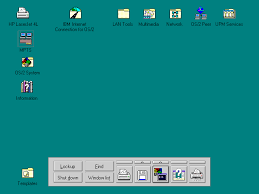Testament for the Recognition of a World-wide OS/2 Warp Appreciation Day
On October 11th, we honor the anniversary of IBM’s release of OS/2 Warp 3.0—a bold step forward in operating system design, made without Microsoft’s involvement. This date stands as World-wide OS/2 Warp Appreciation Day, celebrating the legacy of one of the most innovative and resilient operating systems in history.
OS/2 Warp was more than just a product of its era; it was a visionary platform that introduced concepts and capabilities ahead of its time, laying the groundwork for future advancements in software engineering. Today, enthusiasts, historians, and technologists reflect on OS/2 Warp’s enduring influence, recognizing its role in shaping the evolution of modern computing.
Ahead of Its Time: A Visionary Operating System
OS/2 Warp, developed by IBM after Microsoft’s departure, was a marvel of engineering that was years ahead of its time. Released in the early 1990s, it offered features that were revolutionary, even by today’s standards. The operating system provided an unprecedented level of stability, efficiency, and multitasking capability, setting it apart from its competitors. At a time when most users were still grappling with the limitations of single-tasking environments, OS/2 Warp introduced true preemptive multitasking, allowing users to run multiple applications simultaneously without compromising system performance.
The forward-thinking architecture of OS/2 Warp included robust support for 32-bit applications at a time when 16-bit operating systems were still the norm. It also provided seamless backward compatibility with DOS and Windows applications, purportedly faster and more stable Win-OS/2 than MS Windows at the time [A better Windows than Windows, a better DOS than DOS*], making it a versatile platform that could serve a broad range of users and industries. The inclusion of the Workplace Shell (WPS) introduced an object-oriented graphical user interface, which was both intuitive and powerful, offering a level of customization and control that modern operating systems still fall short of achieving.
Robustness and Fault Tolerance: An Uncompromising Fortress
One of the most remarkable aspects of OS/2 Warp was its robustness and fault tolerance. IBM engineered OS/2 Warp to be a system that would not only perform exceptionally under normal conditions but also maintain its integrity and stability in the face of unexpected challenges. The operating system was designed to recover gracefully from software crashes and system errors, ensuring that a single faulty application could not bring the entire system down — a level of fault tolerance that remains unmatched in many of today’s operating systems.
The beauty of OS/2 Warp lay in its meticulous attention to detail in terms of system reliability. The architecture was built with an emphasis on minimizing downtime and maximizing productivity, making it a favored choice for mission-critical environments such as banking, telecommunications, public transit logistics and industrial control systems. The system’s ability to handle large workloads and complex processes with minimal risk of failure made it a trusted platform for enterprises that demanded the highest levels of dependability.
The Legacy of OS/2 Warp: A Testament to Excellence
OS/2 Warp’s contributions to the evolution of operating systems cannot be overstated. Its legacy lives on in the many features and concepts that have been adopted by modern operating systems. However, the true brilliance of OS/2 Warp lies not just in its technological innovations, but in the vision it represented — a vision of a world where computers could be both powerful and reliable, where users could trust their systems to perform consistently and without failure.
In recognizing a World-wide OS/2 Warp Appreciation Day, we honor not just the operating system itself, but the spirit of innovation and excellence that it embodies. We pay tribute to the engineers and developers who dared to push the boundaries of what was possible, creating a platform that was not just a product, but a paradigm shift in the way we think about computing.
Let us celebrate OS/2 Warp, not as a relic of the past, but as a beacon of what technology can achieve when driven by a commitment to quality, innovation and user empowerment. On this day when OS/2 Warp 3.0 was first released 30 years ago on October 11th 1994, we recognize the enduring impact of OS/2 Warp and re-affirm our appreciation for the operating system that was, and still is ahead of its time.
Live Long and Prosper,
Jason Page
An Enthusiast and Advocate for OS/2 Warp
* Quote from: John C. Dvorak from PC Magazine in the early 1990s.
P.S. Some ideas on celebrating OS/2 Warp 3.0:
- Promote OS/2 Warp’s legacy on social media platforms with the hashtag #OS2WarpDay.
- Share fun facts, screenshots, and personal stories about OS/2 and its impact.
- Organize a multiplayer session or tournament featuring classic games that run on OS/2, such as Doom, Civilization or SimCity.
- Design and print custom OS/2 Warp merchandise, like T-shirts, posters, or stickers.
- Host a contest for the best design related to OS/2 Warp’s legacy.
- Continue to spread the word and collect more support for October 11th as Worldwide OS/2 Warp Appreciation Day.
- Share stories about OS/2’s influence on modern computing and push for official recognition.

![]()





